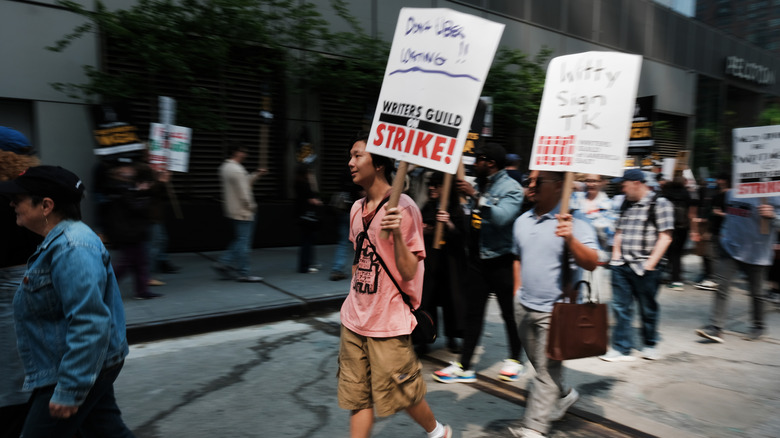George R.R. Martin Weighs In On The Writer's Strike (& Why He Hates Mini-Rooms)
Everybody's weighing in on the Writer's Guild of America strike — including author George R.R. Martin, who's writted everything from sprawling fantasy novels to screenplays. The "Song of Ice and Fire" scribe, like so many other writers, is standing behind the WGA as they ask for fair compensation in the streaming age, and has some specific criticisms about a practice known as "mini-rooms."
On his blog — dubbed Not a Blog — Martin addressed the strike and called out major studios for not compromising on one big issue. "I want to say a few words about what I think is THE most important issue in the current writers' strike: the so-called 'mini rooms' that the Guild is hoping to abolish, and the terrible impact they are having on writers at the start of their careers," he wrote."
From there, Martin opened up about the beginning of his career, which launched in writer's rooms for "The Twilight Zone" and the short-lived "Beauty and the Beast" television series. As he tells it, "A Song of Ice and Fire" and its HBO adaptation "Game of Thrones" were only possible because of what he learned from that work, and "mini-rooms" could prevent other writers from having a similar experience.
George R.R. Martin thinks mini-rooms are a huge problem for writers
All Martin wants is for writers to have the same opportunities that he once had — but as he says, they can't in this new landscape. Thanks to what's referred to as "mini-rooms," which limits the number of new writers through a specific power structure, that opportunity may not exist.
"Mini rooms are abominations, and the refusal of the AMPTP to pay writers to stay with their shows through production — as part of the JOB, for which they need to be paid, not as a tourist — is not only wrong, it is incredibly short-sighted," Martin writes. "If the story editors of 2023 are not allowed to get any production experience, where do the studios think the showrunners of 2033 are going to come from? If nothing else, the WGA needs to win on that issue. No matter how long it may take."
Martin certainly knows a thing or two about television writing beyond "The Twilight Zone," as he's been on set for adaptations of his own work with both "House of the Dragon" and "Game of Thrones." Interestingly, Martin did not address that, amidst many other shows halting production until the strike is settled to stand with the WGA, "House of the Dragon" has not paused its filming for Season 2, but he did write in an earlier blog post that another spinoff, "The Hedge Knight," has stopped production in solidarity with the WGA.
What is a mini-room, and what does the WGA want?
So what is a mini-room? Martin breaks it down earlier in his post: "Streamers and shortened seasons have blown the ladder to splinters. The way it works now, a show gets put in development, the showrunner assembles a 'mini-room,' made up of a couple of senior writers and a couple newcomers, they meet for a month or two, beat out the season, break down the episodes, go off and write scripts, reassemble, get notes, give notes, rewrite, rinse and repeat... and finally turn into the scripts. And show is greenlit (or not, some shows never get past the room) and sent into production. The showrunner and his second, maybe his second and his third, take it from there. The writer producers. The ones who already know all the things that I learned on 'Twilight Zone.'"
Martin goes into further detail from here, but when all is said and done, it's pretty clear that mini-rooms end up shutting out writers who need learning experiences and are just starting their career... so, in essence, mini-rooms prevent people from getting a foothold in this difficult industry. Beyond these, what else does the WGA hope to accomplish? A lot of it boils down to the fact that streaming has totally changed how writers are compensated for their work, an issue studios have largely ignored, and there's also issues regarding artificial intelligence potentially being used by studios. Things have changed since the last strike in 2007, and studios need to acknowledge that; clearly, Martin agrees.


